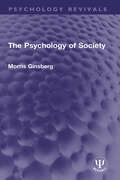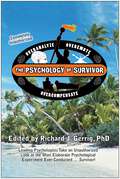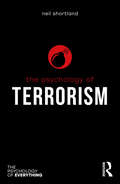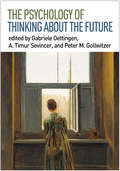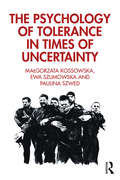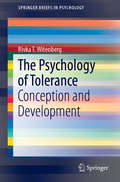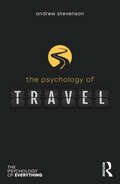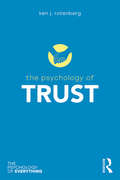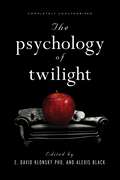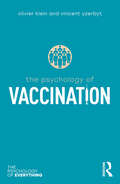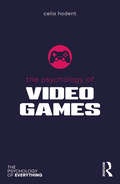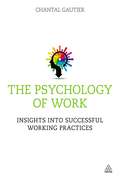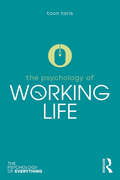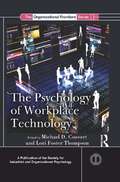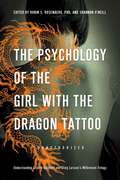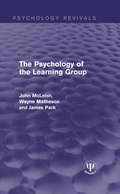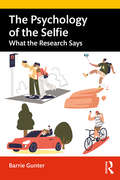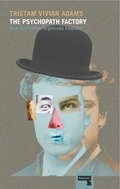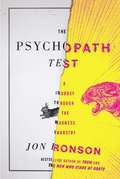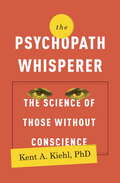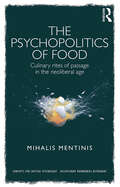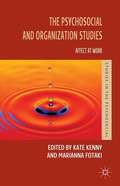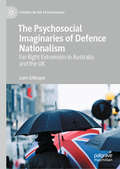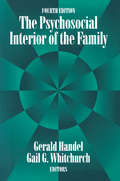- Table View
- List View
The Psychology of Society (Psychology Revivals)
by Morris GinsbergFirst published in 1964, The Psychology of Society deals with the idea of building up a social psychology or the science of human nature. The author confines himself to a discussion of certain of its fundamental problems and offers a critical account of the theories as to the nature of the social mind. This edition includes a new introduction and new material brought into the appendices, but the central themes remain valid and therefore unaltered. This book will be of interest to students of psychology and sociology.
The Psychology of Survivor: Leading Psychologists Take an Unauthorized Look at the Most Elaborate Psychological Experiment Ever Conducted . . . Survivor!
by Richard J. GerrigSurvivor has proven to be one of the most popular shows to ever hit television screens. What has this pop culture phenomenon shown us - by placing a few hundred people on islands around the world - about the psychological make-up of the average American? In Psychology of Survivor, the third installment of BenBella Books's Psychology of Popular Culture series, leading psychologists - and fans of Survivor - unite to offer up their expertise on the show that started the reality show craze. From why macho alpha males rarely win to stress and body image, from situational ethics to the dreaded Rob Cestaries factor, Psychology of Survivor is a broad look at cutting-edge psychological issues through the lens of Survivor. The tribe has spoken - Psychology of Survivor is the best book for Survivor fans and psychology enthusiasts alike!
The Psychology of Terrorism (The Psychology of Everything)
by Neil ShortlandWhat is terrorism? Can anyone be radicalized? How can we respond to terrorist acts? The Psychology of Terrorism seeks to explain why some acts of violence are considered terrorism and others are not, and why some individuals may be more susceptible to engaging in radical terrorist behavior. Debunking myths and lazy stereotypes, the book delves into some of the most shocking atrocities of our times to discuss the complex and varied psychological characteristics of individual terrorists, organized groups, and their acts. Whilw there is no simple solution, The Psychology of Terrorism shows us that a growing reverse radicalization movement and modern interventionist techniques can give us hope for the future.
The Psychology of Thinking about the Future
by Gabriele Oettingen Peter M. Gollwitzer A. Timur SevincerWhy do people spend so much time thinking about the future, imagining scenarios that may never occur, and making (often unrealistic) predictions ? This volume brings together leading researchers from multiple psychological subdisciplines to explore the central role of future-thinking in human behavior across the lifespan. It presents cutting-edge work on the mechanisms involved in visualizing, predicting, and planning for the future. Implications are explored for such important domains as well-being and mental health, academic and job performance, ethical decision making, and financial behavior. Throughout, chapters highlight effective self-regulation strategies that help people pursue and realize their short- and long-term goals.
The Psychology of Tolerance in Times of Uncertainty
by Malgorzata Kossowska Ewa Szumowska Paulina SzwedThis unique book lays out the motivational basis for tolerance, the most important underlying factor that shapes people’s social attitudes and determines our ability to get along with others. Closed- or open-mindedness distinguishes people open to information and new ideas, prepared to change their views, from people who are rigidly attached to their convictions and resistant to the unknown. Demonstrating how the mechanism underlying closed-mindedness is rooted in uncertainty and fear, with the fundamental consequence of closed-mindedness being intolerance, the author shows how basic features of human psychology drive large-scale socio-political developments that determine the fate of peoples and nations. Kossowska argues that recent political events across Europe, including the popularity and rise of extreme right-wing groups, are no longer adequately explained by traditional distinctions like people versus the elite, religion versus no religion, left versus right. Exploring how this can provide knowledge to increase the capability of people, groups, or societies to improve their lives in an era of uncertainty created by economic and political turmoil, the book also focuses on discussing ways to make people more open, thus tolerant. Written from a psychological perspective, this is an ideal resource for students and academics in psychology and social and political science, as well as anybody interested in understanding psychological mechanisms of intolerance.
The Psychology of Tolerance: Conception and Development (SpringerBriefs in Psychology)
by Rivka T. WitenbergThis book offers a new standpoint to understanding tolerance to human diversity by approaching it from the perspectives of cognitive, developmental and prosocial psychology. Emphasising the positive aspects of social perception and behaviour, it invites readers to re-consider ‘tolerance’ not simply as the opposite of prejudice, but as something that can in fact coexist with prejudice and intolerance. Drawing on original empirical research conducted with children, adolescents and young adults, the book maps the response patterns for tolerant judgement and justification, including psycho-developmental factors. It explains how tolerance regarding differences of colour, creed and culture is based on underlying beliefs that guide the reasoning process to support judgements about human diversity. Showcasing emerging theory and a new methodology of data collection that goes beyond common approaches, this book outlines a unique potential developmental trajectory for tolerance to human diversity based on fairness, empathy and reason. The book challenges students, researchers and general readers across the fields of psychology, human ethics and moral philosophy with its new insights into the character of prosocial beliefs.
The Psychology of Travel (The Psychology of Everything)
by Andrew StevensonWhy do we travel? Are holidays good for our health? What are the social and psychological factors that drive us to move? The Psychology of Travel provides an eclectic introduction to the range of travel experiences from commuting, to going on holiday, to studying abroad. Travel is a near-universal experience and manifests itself in various forms, from everyday experiences to exotic adventure, although it varies across time and cultures. The book unpacks the concept of travel, and engages with topics including migration, wellbeing, acculturation, wayfinding, slow travel, place attachment and nostalgia, and brings them into sharp focus in relation to globalisation and climate change, By asking what drives us to journey and offering key insights into the psychological factors behind different kinds of travel, The Psychology of Travel introduces the reader to new ways of thinking about global mobility and movement.
The Psychology of Trust (The Psychology of Everything)
by Ken J. RotenbergWhat makes us trust people? How is trust developed and maintained? Is Western society facing a crisis of trust? The Psychology of Trust addresses trust issues that are directly relevant to peoples’ experiences in their daily lives. It identifies the factors that cause people to trust, and the consequences of trust for real world issues in health, politics, terrorism, the workplace, and religious faith. It also explores the impact of a lack of trust, and what causes distrust of individuals, groups and organisations. In a world where trust impacts our daily lives, The Psychology of Trust shows the role trust plays in our relationships, and provides practical guidance regarding our own trust in others.
The Psychology of Twilight
by David A. FrederickYou've read the books. You've seen the films. Now get inside the heads of your favorite Twilight characters (just like Edward can!) in The Psychology of Twilight. Explore the minds and motives of Bella, Edward, Jacob, and more with a deeper look at the series that's captured the hearts—and psyches—of millions. Find out: How Edward and Jacob match up in an evolutionary psychology smackdown for Bella's—and our—affection Whether Bella's motorcycle-riding and cliff diving in New Moon are suicidal—or her salvation Why vampires and werewolves aren't so different after all (at least psychologically) The emotional appeal of love stories like Bella and Edward's Why being a part of Twilight fandom is good for your psychological health Snuggle up on the closest chaise, and get ready to revisit the Twilight Saga—with some professional help.
The Psychology of Vaccination (The Psychology of Everything)
by Vincent Yzerbyt Olivier KleinWhy do some people choose to be vaccinated and others do not? What is the difference between vaccine hesitancy and anti-vaccinism? What can social psychology tell us about attitudes towards vaccination?The Psychology of Vaccination identifies the social psychological drivers of vaccine mindsets, to explore why some people choose to be vaccinated, some are hesitant, and others refuse. It explores the socio-demographic factors related to vaccine hesitancy and considers the role of motivation in making this health decision. The book focuses on how individuals are social beings, inserted into a web of influences that guide their behaviour, and considers the impact this may have on their health choices.Not only aimed at the convinced, but also for all those who have doubts about vaccination, The Psychology of Vaccination offers an insightful look at our health behaviours and considers whether it is possible to affect health behaviour change.
The Psychology of Video Games (The Psychology of Everything)
by Celia HodentWhat impact can video games have on players? How does psychology influence video game creation? Why do some games become cultural phenomena? The Psychology of Video Games explores the relationship between psychology and video games from the perspective of both game developers and players. It looks at how games are made and what makes them fun and successful, the benefits gaming can have on players in relation to education and healthcare, concerns over potential negative impacts such as pathological gaming, and ethics considerations. With gaming being one of the most popular forms of entertainment today, The Psychology of Video Games shows the important role played by an understanding of the human brain and its mental processes in the development of ethical and inclusive video games.
The Psychology of Work
by Chantal GautierThe Psychology of Work integrates psychological theory with personal narrative from global industry leaders, as well as those entering the workforce, to offer tangible insights into the real world of work. It is ideal for students, professionals and anyone with an interest in how successful organizations operate. It charts the development of the field of organizational psychology and provides the key theoretical frameworks. Crucially, it explores how these can be utilised to enhance organizational culture, and why this is so relevant and important in the modern workplace.Through the inclusion of interviews with students, The Psychology of Work reveals what the future workforce expect of the organizations that they are going in to and encourages students reading the book to reflect on what kind of leaders they would like to be. The book is also a valuable resource to support professionals and practitioners, highlighting current working practices and the need for change, offering practical guidance on how to bring the 'humane' back into organizational life.
The Psychology of Working Life (The Psychology of Everything)
by Toon W. TarisWhat motivates us to do a good job? When does the pressure of work impact upon our health and well-being? How can employers choose the right candidates? The Psychology of Working Life shows how, whether we like it or not, the way we work, and our feelings about it, play a fundamental role in overall well-being. From the use of psychometrics in recruiting the right candidate, to making working life more efficient, the book illustrates how work in industrialized societies continues to be founded upon core psychological ideas. Motivation and job satisfaction have become recognized as key to job design and The Psychology of Working Life suggests that changing the way we work can impact on our stress levels, overall health, and productivity.
The Psychology of Workplace Technology (SIOP Organizational Frontiers Series)
by Lori Foster Thompson Michael D. CoovertRecent advances in technology have dramatically altered the manner in which organizations function, transforming the way people think about and perform their work. The implications of these trends continue to evolve as emerging innovations adapt to and are adapted by organizations, workers, and other components of the socio-technical systems in which they are embedded. A rigorous consideration of these implications is needed to understand, manage, and drive the reciprocal interplay between technology and the workplace. This edited volume brings together top scholars within and outside of the field of industrial and organizational (I-O) psychology to explore the psychological and organizational effects of contemporary workplace technologies. A special section is included at the end of the book by four experts in the field entitled Reflections and Future Directions.
The Psychology of the Girl with the Dragon Tattoo: Understanding Lisbeth Salander and Stieg Larsson's Millennium Trilogy
by Lynne McDonald-SmithLisbeth Salander, heroine of Stieg Larsson's The Girl with the Dragon Tattoo and its sequels, is one of the most compelling, complex characters of our time. Is she an avenging angel? A dangerous outlaw? What makes Salander tick, and why is our response to her—and to Larsson's Millennium trilogy—so strong? In The Psychology of the Girl with the Dragon Tattoo, 19 psychologists and psychiatrists attempt to do what even expert investigator Mikael Blomkvist could not: understand Lisbeth Salander. What does Lisbeth's infamous dragon tattoo really say about her? Why is Lisbeth so drawn to Mikael, and what would they both need to do to make a relationship work? How do we explain men like Martin Vanger, Nils Bjurman, and Alexander Zalachenko? Is Lisbeth just as sexist and as psychopathic as they are? What is it about Lisbeth that allows her to survive, even thrive, under extraordinary conditions? How is Lisbeth like a Goth-punk Rorschach test? And what do we learn about ourselves from what we see in her?
The Psychology of the Internet
by Patricia WallaceThis timely volume explores the psychological aspects of cyberspace, a virtual world in which people from around the globe are acting and interacting in many new, unusual, and occasionally alarming ways. Drawing on research in the social sciences, communications, business, and other fields, Patricia Wallace examines how the online environment can influence the way we behave, sometimes for the better, sometimes not. Our own online behavior then becomes part of the Internet's psychological environment for others, creating opportunities for shaping the way this new territory for human interaction is unfolding. Since the Internet--and our experience within it--is still young, we have a rare window of opportunity to influence the course of its development. With a new preface that incorporates many of the changes online and in the field since the hardcover edition was published, the paperback edition of The Psychology of the Internet includes the latest coverage of e-commerce, workplace surveillance and datamining, all areas of recent intense public concern. Patricia M. Wallace is Executive Director of the Center for Knowledge and Information Management at the Robert H. Smith School of Business, University of Maryland. She is author of an interactive psychology CD-ROM called PRISM and of the textbook Introduction to Psychology, Fourth Edition (with Jeffrey Goldstein). Dr. Wallace is also the principal investigator on grants from the Annenberg Projects/Corporation for Public Broadcasting dealing with language learning through CD-ROMs and the Internet.
The Psychology of the Learning Group (Psychology Revivals)
by James Park John McLeish Wayne MathesonOriginally published in 1973, this work takes a hard look at the claims made for the small group as a learning medium (lecture, structured discussion, ‘sensitivity’, training groups etc.). Various theories of group dynamics, leadership function and learning process are looked at critically on the basis of actual research findings. It was intended for students of social psychology and anyone teaching or training to teach at Further Education level at the time, and will still be of interest in its historical context today.
The Psychology of the Selfie: What the Research Says
by Barrie GunterThe Psychology of the Selfie provides a comprehensive overview and analysis of research on the significance of selfies, offering insights into the topic from a psychological perspective and examining important issues such as body image, self-objectification, mental health and psychological benefits. Selfies are a worldwide phenomenon. Although dismissed by critics as a sign of self-absorbed narcissism, they are also a social currency that maintains and reinforces friendships, a feedback loop for self-identity affirmation, a promotional tool for gaining social influence, and a method for preserving memories of life events. In this book, Barrie Gunter expertly explores the psychological underpinnings of the contemporary global phenomenon of "selfies", from the historical roots and meteoric rise due to technical advancements, to the different personality types of selfie-takers, to social relationships, to group and personal identity. Looking at both the psychological nature and impact of selfies, this book reviews different psychological outcomes for selfie-takers, both positive and negative, and the growth in psychological and physical problems that can sometimes arise. Presenting a comprehensive analysis specifically of selfie behaviour, this book is an essential reference for students and researchers in communications and media, journalism, information studies, psychology and sociology, as well as anyone with a general interest in the phenomenon.
The Psychopath Factory: How Capitalism Organizes Empathy
by Tristam AdamsThe Psychopath Factory: How Capitalism Organizes Empathy examines how the requirements, stimuli, affects and environments of work condition our empathy. In some cases, work calls for no empathy - characters who don't blink or flinch in the face of danger nor crack under pressure. In other cases, capitalism requires empathy in spades -charming, friendly, sensitive and listening managers, customer service agents and careers. When workers are required to either ignore their empathy to-do a job, or dial it up to increase productivity, they are entering a psychopathic modality. The affective blitz of work, flickering screens, emotive content, vibrating alerts and sounding alarms erode our sensitivities whilst we are modulated with attention stimulants, social lubricants and so called anti-anxiety drugs. This is amidst a virulent and exacerbating climate of competition and frenzied quantification. Capitalism pressures us to feign empathy and leverage social relationships on one hand, whilst being cold and pragmatic on the other. We are passionate and enthusiastic whilst keeping a professional distance. Sympathy, care, compassion and altruism are important; The Psychopath Factory: How Capitalism Organizes Empathy argues that itis a mistake to presuppose that empathy can achieve these. Rather than being subject to the late capitalist organization of our empathy, psychopathy could be a means of escape.
The Psychopath Test: A Journey Through the Madness Industry
by Jon RonsonIn this madcap journey, a bestselling journalist investigates psychopaths and the industry of doctors, scientists, and everyone else who studies them. The Psychopath Test is a fascinating journey through the minds of madness. Jon Ronson's exploration of a potential hoax being played on the world's top neurologists takes him, unexpectedly, into the heart of the madness industry. An influential psychologist who is convinced that many important CEOs and politicians are, in fact, psychopaths teaches Ronson how to spot these high-flying individuals by looking out for little telltale verbal and nonverbal clues. And so Ronson, armed with his new psychopath-spotting abilities, enters the corridors of power. He spends time with a death-squad leader institutionalized for mortgage fraud in Coxsackie, New York; a legendary CEO whose psychopathy has been speculated about in the press; and a patient in an asylum for the criminally insane who insists he's sane and certainly not a psychopath. Ronson not only solves the mystery of the hoax but also discovers, disturbingly, that sometimes the personalities at the helm of the madness industry are, with their drives and obsessions, as mad in their own way as those they study. And that relatively ordinary people are, more and more, defined by their maddest edges.
The Psychopath Whisperer: The Science of Those Without Conscience
by Kent A. KiehlA compelling journey into the science and behavior of psychopaths, written by the leading scientist in the field of criminal psychopathy.We know of psychopaths from chilling headlines and stories in the news and movies--from Ted Bundy and John Wayne Gacy, to Hannibal Lecter and Dexter Morgan. As Dr. Kent Kiehl shows, psychopaths can be identified by a checklist of symptoms that includes pathological lying; lack of empathy, guilt, and remorse; grandiose sense of self-worth; manipulation; and failure to accept one's actions. But why do psychopaths behave the way they do? Is it the result of their environment-- how they were raised--or is there a genetic component to their lack of conscience? This is the question Kiehl, a protégé of famed psychopath researcher Dr. Robert Hare, was determined to answer as he began his career twenty years ago. To aid in his quest to unravel the psychopathic mind, Kiehl created the first mobile functional MRI scanner to study psychopaths in prison populations. The brains of more than five hundred psychopaths and three thousand other offenders have been scanned by Kiehl's laboratory--the world's largest forensic neuroscience repository of its kind. Over the course of The Psychopath Whisperer, we follow the scientific bread crumbs that Kiehl uncovered to show that the key brain structures that correspond with emotional engagement and reactions are diminished in psychopaths, offering new clues to how to predict and treat the disorder. In The Psychopath Whisperer, Kiehl describes in fascinating detail his years working with psychopaths and studying their thought processes-- from the remorseless serial killers he meets with behind bars to children whose behavior and personality traits exhibit the early warning signs of psychopathy. Less than 1 percent of the general population meets the criteria for psychopathy. But psychopaths account for a vastly outsized proportion of violent crimes. And as Kiehl shows, many who aren't psychopaths exhibit some of the behaviors and traits associated with the condition. What do you do if you discover your roommate, or boss, or the person you are dating has traits that define a psychopath? And what does having a diminished limbic region of the brain mean for how the legal system approaches crimes committed by psychopaths? A compelling narrative of cutting-edge science, The Psychopath Whisperer will open your eyes on a fascinating but little understood world, with startling implications for society, the law, and our personal lives.From the Hardcover edition.
The Psychopolitics of Food: Culinary rites of passage in the neoliberal age (Concepts for Critical Psychology)
by Mihalis MentinisThe Psychopolitics of Food probes into the contemporary ‘foodscape’, examining culinary practices and food habits and in particular the ways in which they conflate with neoliberal political economy. It suggests that generic alimentary and culinary practices constitute technologies of the self and the body and argues that the contemporary preoccupation with food takes the form of ‘rites of passage’ that express and mark the transition from a specific stage of neoliberal development to another vis-à-vis a re-configuration of the alimentary and sexual regimes. Even though these rites of passage are taking place on the borders of cultural bi-polarities, their function, nevertheless, is precisely to define these borders as sites of a neoliberal transitional demand; that is, to produce a cultural bifurcation between ‘eating orders’ and ‘eating dis-orders’, by promoting and naturalising certain social logics while simultaneously rendering others as abject and anachronistic. The book is a worthwhile read for researchers and advanced scholars in the areas of food studies, critical psychology, anthropology and sociology.
The Psychosocial And Organization Studies
by Kate Kenny Marianna FotakiLeading authors within organization studies and also from broader social science disciplines present the state of the art in the rapidly developing field of psychosocial approaches to organization studies and critical management studies.
The Psychosocial Imaginaries of Defence Nationalism: Far-Right Extremism in Australia and the UK (Studies in the Psychosocial)
by Liam GillespieThe Psychosocial Imaginaries of Defence Nationalism interrogates the emergence of far-right nationalist 'defence leagues' in Australia and the UK. Throughout the book, Liam Gillespie refers to these groups as defence nationalists: that is, as nationalists who imagine themselves as defenders of the nation and therefore national subjects par excellence. Drawing on original research, psychoanalytic and psychosocial theory—and particularly the work of Jacques Lacan—the author explores the narratives, imaginaries and subjectivities that sustain these groups, as well as the narratives, imaginaries and subjectivities these groups sustain. He argues that unlike other nationalist groups, defence nationalists are not primarily concerned with realising their avowed political projects. Instead, they are concerned with constructing and then enjoying themselves as the nation's self-ordained defenders. This means that which threatens the nation can paradoxically have a fortifying effect upon defence nationalists, legitimising and securing both the way they see themselves, and the position they see themselves occupying with/in the nation.The Psychosocial Imaginaries of Defence Nationalism will be of interest to anyone concerned with critical theorisations of contemporary nationalism, as well as with the application of psychoanalytic and psychosocial theory to social, cultural and political analysis.
The Psychosocial Interior of the Family (Social Problems And Social Issues Ser.)
by Gerald HandelDrawing upon findings from many disciplines including sociology, communication, family studies, human development, psychology and anthropology-this book provides the first composite study of the whole family and of the complex interplay between self and collectivity in family life. It departs sharply from the traditional two-person, cause-effect models used in conventional studies, and attempts to delineate a social psychology of the family.This book undertakes to define and understand the nature of families, to point out ways of discerning different family characters, and to comprehend the processes by which these characters are established and maintained; by so doing, it introduces a new dimension into the study of family behavior and provides a framework within which meaningful investigations and practical applications can be pursued.This long-awaited fourth edition continues the goal of preceding editions: to understand families in terms of the kinds of interaction through which family life is constructed. Contributors drawn from a wide variety of disciplines sociology; communication; family studies; human development; psychology; anthropology; and social work - provide a range of authoritative and up-to-date sources on the family and interpersonal relations, including newly emergent forms of family organization. In providing a new framework for fruitful investigation and practical application, this volume contains the best available interdisciplinary work on the social psychology of the family.
